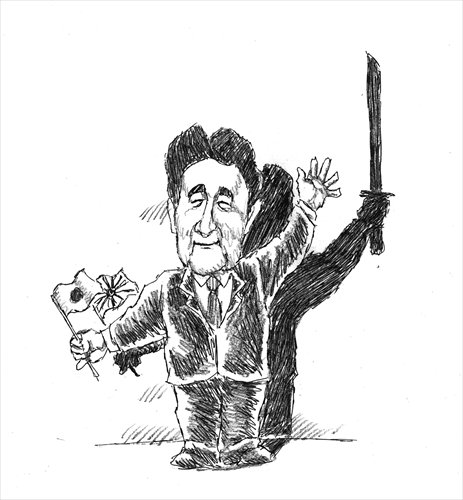Abe should walk his talk in Tokyo summit

Illustration: Peter C.Espina/GT
It was the classic ASEAN pose, with the heads of its member states facing the cameras in one line and each crossing both arms to shake the hands of immediate neighbors. The photo session could well be mistaken for having taken place at yet another ASEAN capital during one of the almost quarterly summits nowadays.
But this time, the snapshot was taken in front of Akasaka State Guesthouse in Tokyo, and smack in the middle was an 11th head of government in the person of Japanese Prime Minister Shinzo Abe. And it was a different kind of summit - the Japan-ASEAN Commemorative Summit.
Billed as a celebration of the 40th anniversary of formal ties between Japan and ASEAN, the summit was in actuality both a cash-fest, in which Japan promised to dish out $20 billion to ASEAN countries over the next five years in aids and loans, as well as an attempt to enable Japan to assume a greater security role in the region.
Southeast Asia is admittedly no stranger to Japanese largesse. In the three decades from the 1960s to 1990s, extravagant Japanese foreign direct investments helped propel the development of many ASEAN countries, including the famed four "little tigers" - Malaysia, Indonesia, Thailand and the Philippines, transforming them from agrarian economies into semi-industrialized ones.
Japanese "soft" culture, in the forms of diligent work ethics and colorful creativity also made their ways into Southeast Asia via generous scholarships and other exchanges.
Starting in the 1990s, however, Japan suffered from a prolonged period of economic stagflation, which persisted for over two decades. Consequently, Japanese investments contracted significantly, with hardly any new Japanese factories being established in any ASEAN country in recent memory.
We welcome the return of Japanese investments, so that we could also partake of the fruits of the much avowed "Abenomics" which is touted as being able to revive the Japanese economy.
Nevertheless, what we perhaps feel much less comfortable with is a Japan seemingly bent on a militaristic resurgence. In various speeches over the past year as well as during his many foreign visits, Abe did not flinch from seeking a greater "security" role for Japan in the region and beyond.
While a greater level of security, collective or individual, is always sought after by all countries, Japan playing an enlarged role in the process is, to say the least, unsettling to many.
Opening the summit earlier this month, Abe vowed "to build the future of Asia where laws, rather than power, rule ... which would lead to a prosperous society with mutual respect."
Indeed, Abe should "walk his talk" in terms of abiding by the law. Japan's Peace Constitution, adopted after the calamities of WWII, is its highest domestic law, and has served Japan well, ushering in its world-renowned economic reconstruction after the war and contributing to its erstwhile friendships around the world.
Conversely, Abe's repeated hints of his and his political colleagues' urge to repeal the "peace" provisions in the Japanese constitution do not bode well for a "prosperous society" in the region.
During the summit, ASEAN and Japanese leaders "agreed to enhance cooperation in ensuring freedom of overflight and civil aviation safety." It goes without saying that this was at least partially a reaction to China's recent delineation of its very first Air Defense Identification Zone (ADIZ) over a span of the East China Sea.
There are various arguments for and against such an ADIZ.
But fundamentally, ADIZs and some of their requirements, such as the filing of flight plans, are not incompatible with overflight freedom and safety of civil aviation. ADIZs do not necessarily imply a claim of sovereignty over the territory concerned. And in any case, the establishment of an ADIZ is not a novel practice. Japan, for example, has for many decades had its own ADIZ.
Indonesian President Susilo Bambang Yudhoyono perhaps best expressed ASEAN's sentiment when he said that good relations between China and Japan were "critical to the future" of the region.
China and Japan, as the two economic powerhouses in the region, should constantly emphasize peaceful developments in both words and deeds, and perhaps join hands in helping some of their least developed neighbors.
In this process, friendships will once again bloom for the betterment of all in the region.
The author is a senior fellow with the S. Rajaratnam School of International Studies, Nanyang Technological University, Singapore. opinion@globaltimes.com.cn